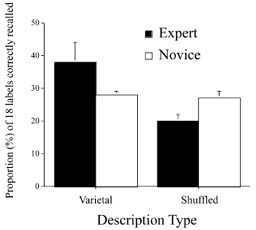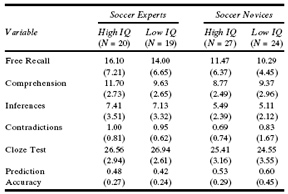
The Role of Knowledge in Expertise
One characteristic of expertise is the exhibition of a great deal of content knowledge that is organized in ways that are useful with the subject matter (Bransford, Brown, and Cocking, 2000). Regardless of which of the four major theories of expertise is the most correct, knowledge certainly plays a significant role in the phenomenon. While knowledge, expertise, and IQ are all related and important, they are not the same concept. In some applications, extensive knowledge of a subject matter might be more important than a personís natural expertise-enabling abilities (Hughson & Boakes, 2002). In other settings, expertise might reduce the importance of IQ in predicting success in memory tasks (Schneider, Bjorklund, and Maier-Bruckner, 1996). Finally, there is disagreement in the field over the reasons for the demonstrated correlation between expertise and memory recall after very brief exposure times (Vicente & Wang, 1998; Simon & Gobet, 2000; Ericsson, Patel, and Kintsch, 2000; Vicente, 2000).
Knowledge for Wines
The domain of wines is quite interesting, as it has long been thought that much expertise is due to superior sensory ability rather than knowledge. Hughson and Boakes (2002) conducted a study with several experiments that aim to determine the role of knowledge-based expertise in wine-related cognitive tasks. The result seems to be that experiences individuals perform better than novices in large part due to a superior wine vocabulary, allowing them to organize information more optimally.

Fig. 1. Experiment 1: The memory performance (mean+1 standard error) of 8 experts and 21 novices for Varietal and Shuffled wine descriptions with Varietal descriptions being examples of true descriptions while Shuffled descriptions were organised in a manner reflecting no known grape variety.
(Hughson & Boakes, 2002)
In the first experiment, subjects were presented with three six-word wine descriptions for 5 seconds each. Some descriptions were "varietal", using a typical sensory description for a particular variety of wine, while others were "shuffled", using random wine terms arranged in a meaningless way. After each trial, subjects were asked to write down as many of the words they could from the description. The results were that expert subjects performed better than their novice counterparts on the varietal descriptions while novice subjects performed better on the shuffled descriptions. This is presumably due to the fact that experts are more familiar with these terms and better able to integrate them within an established wine category structure.
A second experiment was conducted under incidental rather than intentional conditions. The results were similar to the first, showing that the knowledge of wine experts is readily accessible without significant attentional effort.
Third and fourth experiments explored the effect of providing vocabulary lists on novice wine description. The third experiment showed a positive effect, while the fourth showed no effect. In both, the performance of experts was still superior.
This study seems to show that a deep-seated knowledge of a subject area is necessary for superior performance in memory tasks. Chess-based studies show the importance of efficient and organized information processing, but the domain of wine provides evidence that knowledge itself plays an important role.
Expertise and IQ in Memory Tasks
It seems obvious that individuals with higher IQ will perform better than those with lower IQ in memory tasks. IQ, however, is not the only predictor of performance. Expertise in the particular subject area of the memory task can reduce the effect of IQ, although it does not eliminate its influence (Schneider, Bjorklund, and Maier-Bruckner, 1996).
In the Schneider et. al. (1996) experiments, fourth grade children were divided into four categories, (1) highaptitude soccer experts; (2) low-aptitude soccer experts; (3) high-aptitude soccer novices; (4) and low-aptitude soccer novices.
In the first experiment, the children were presented with a story about a soccer game and then asked to freely recall it in written form. The children were also subjected to a 15-item interview concerning the story and a sort-recall task with 20 soccer-related pictures to be grouped into 4 categories.

TABLE 3
Means and Standard Deviations (in Parentheses) of the Various Text Recall and Comprehension Variables of Study 1 as a Function of Expertise and IQ Level
(Schneider et. al., 1996)
The experiment showed that the role of knowledge-based expertise in moderating IQ effects depended on the particular memory task performed. In the case of free recall of the story, soccer expertise was the only variable with a significant effect on recall, practically eliminating the effect of IQ. In the sort- recall task, however, the performance of low-IQ experts was similar to that of high-IQ novices, demonstrating that expertise did not eliminate the effect of IQ but that it did compensate for the effects of low IQ.
The second experiment followed the same basic design as the first, except for the fact that each child was tested individually rather than in a group. It was found that this slight change in experimental design was not a factor, and the implications of the first study remain the same.
An Expert Controversy: the Constraint Attunement Hypothesis
Vicente and Wang (1998) assert that there is no solid theoretical explanation for the correlation between domain expertise and memory recall after a very brief exposure time. They propose a constraint attunement hypothesis (CAH) which predicts that the advantage of expertise will be positively dependent on the extent to which individuals are attuned to goal-relevant constraints in the material. The authors recount numerous studies and use them to explain and justify their hypothesis. Despite all of their examples as well as the seemingly intuitive logic of the CAH, many people in the field disagree with the idea.
Simon and Gobet (2000) published an article attacking the logic of Vicente and Wang (1998). In their article, they address each experiment mentioned by the CAH advocates and state why it does not support the CAH. They conclude by explaining that theories such as EPAM-TEMP are far superior, predicting a wider range of phenomena while making fewer ad-hoc assumptions.
In another critique, Ericsson, Patel, and Kintsch (2000) explain that the criticism by Vicente and Wang (1998) of the Long-Term Working Memory (LTWM) theory is based on misrepresented facts. They argue that a process-based theory such as LTWM is far superior to a product theory such as CAH.
Given its rejection by the foremost researchers in the field of expertise, it seems that the constraint attunement hypothesis represents an unsuccessful attempt to create an ecological theory rather than a process-based theory.

All Rights Reserved
